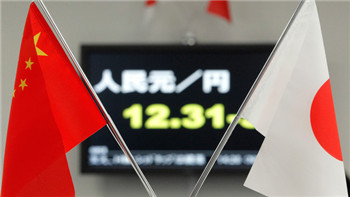(单词翻译:单击)

As recently as 10 years ago, an economic slowdown in China would have caused barely a ripple in Japan.
放在10年前,中国经济放缓几乎不会在日本激起波澜。
At that time, most of Japan’s exports to China were components such as liquid crystal displays. They would be assembled into televisions at Japanese-owned factories and then re-exported. What mattered was demand in the final markets for consumer goods, in particular the US.
当时,日本主要对华出口液晶显示器之类的零配件。它们会在日资工厂被组装成电视,然后再出口。重要的是消费品最终市场的需求,特别是美国这个市场的需求。
But times have changed. “The importance of final demand in China is increasing for the Japanese economy. It was almost to the US level as of the last data in 2011. It probably matched the US by 2014,” said Naohiko Baba, chief Japan economist at Goldman Sachs.
但如今时代不同了。高盛(Goldman Sachs)首席日本经济学家马场直彦(Naohiko Baba)表示:“对于日本经济而言,中国最终需求的重要性正在提升。在2011年上次数据出炉时,中国需求的重要性几乎与美国持平。到2014年,中国或许已赶上美国。”
With the Japanese economy already wobbling — the economy contracted by an annualised 1.6 per cent in the second quarter — weakness in China is the latest global shock to undermine the Abenomics stimulus programme on which Prime Minister Shinzo Abe has staked his leadership. China’s slowdown could force the Bank of Japan’s hand on further easing of monetary policy, analysts say. The BoJ, already under pressure from weak consumption at home, would be most likely to act at its October and January meetings, where it makes new economic forecasts.
由于日本经济已是风雨飘摇(按年率计算,今年第二季度,日本经济收缩1.6%),中国经济疲弱正成为破坏“安倍经济学”(Abenomics)刺激计划的最新外部打击。日本首相安倍晋三(Shinzo Abe)把自己的领导权押在了该计划上。分析人士表示,中国经济放缓可能会迫使日本央行(Bank of Japan)进一步放松货币政策。已因国内消费疲软承受压力的日本央行,在10月和明年1月会议上采取行动的可能性最大。在这些会议上,日本央行将做出新的经济预测。
For its part, the BoJ insists its massive asset-buying programme remains on course to overcome deflation. Haruhiko Kuroda, BoJ governor, reiterated this in New York on Wednesday, but added that the BoJ would ”make adjustments without hesitation if necessary”.
日本央行坚称,其大规模资产购买计划仍然有望战胜通缩。日本央行行长黑田东彦(Haruhiko Kuroda)周三在纽约重申了这点,但补充称,日本央行将“在必要时毫不犹豫地做出调整”。
Using a new global input-output database, Mr Baba estimates that whereas in 2000, final demand in China accounted for 0.5 per cent of Japanese output versus 3.5 per cent for the US, both countries now absorb about 2 per cent of Japan’s value-added goods.
马场直彦利用一个新的全球投入产出数据库估计,在2000年时,来自中国的最终需求占日本经济产出的0.5%,美国最终需求占3.5%,两国现在均吸纳了日本约2%的附加值商品。
As such, China’s growth rate has become as important to Japan as its exchange rate. A fall of 1 percentage point in China’s domestic demand costs Japan 0.1 per cent of gross domestic product, while the hit from a percentage point fall in the renminbi is only 0.01 per cent. Were it just a matter of the direct effect on Japan’s exports, the damage would be painful but contained, but direct exports are the least of it.
因此,就像人民币汇率一样,中国经济增速也变得对日本很重要。中国国内需求下滑1个百分点,将导致日本国内生产总值(GDP)减少0.1%,而人民币汇率下滑1个百分点,将导致日本GDP减少0.01%。如果问题只是对日本出口产生直接影响的话,这种破坏将是痛苦的,但很有限,然而直接出口是最不重要的。
Whereas 18 per cent of Japan’s exports go to China, 54 per cent go to Asia as a whole, and a slowdown in China hurts all of the region’s economies. Japanese businesses may postpone investment in new export capacity at home, further hurting demand. japan export
日本有18%的出口流向中国,54%流向整个亚洲,而中国经济放缓会波及亚洲所有经济体。日本企业可能推迟对国内新的出口能力的投资,这将进一步影响需求。
The International Monetary Fund tries to model the effects of a Chinese downturn in its Spillover Report. The 2014 edition finds a 1 percentage point shock to emerging market growth leads to a 0.5 percentage point fall in Japanese growth; five times bigger than the effect on the US.
国际货币基金组织(IMF)在其《溢出效应报告》(Spillover Report)中尝试模拟中国经济低迷的影响。2014年的报告显示,在中国经济低迷冲击下,新兴市场增速每下滑1个百分点,将导致日本增速下滑0.5个百分点;其对日本的影响是对美国的影响的5倍。
In addition, China’s slowdown is having a broader deflationary effect, most obviously through commodity prices. Oil’s drop to about $40 a barrel all but destroys the BoJ’s schedule for getting inflation back to 2 per cent. Its forecasts are predicated on a bounce in prices to $70 or $75 a barrel.
另外,中国经济放缓正产生更为广泛的通缩效应,在大宗商品价格方面表现的最为明显。油价降至每桶40美元左右,几乎会摧毁日本央行令通胀回到2%的计划。日本央行的预测基于油价反弹至每桶70美元或75美元。
“Although the oil price fall should have a favourable impact on economic activity in the longer term, in the short term it has a downward impact on inflation via the drop in energy prices such as gasoline and electricity,” said Mr Kuroda.
黑田东彦表示:“较长期而言,油价下跌应会对经济活动产生有利影响,但短期内,通过带动汽油和电力等能源价格下跌,将对通胀造成下行影响。”
Economists at Citi in Tokyo estimate the drag on inflation from energy prices will reach 1.5 percentage points by October, and stay above 1 percentage point in the middle of 2016, making a dip into headline deflation more likely.
花旗(Citi)驻东京经济学家估计,能源价格对通胀的拖累将在10月达到1.5个百分点,并将在2016年中保持在1个百分点以上,这将令日本陷入整体通缩的可能性增大。
Mr Kuroda insists this effect is temporary. “Has the trend towards overcoming deflation come to an end?” he said. “This is far from the case.”
黑田东彦坚称,这种影响将是暂时的。“消除通缩的趋势是否已结束?”他表示,“事实远非如此。”
The BoJ’s problem is that its policy relies on convincing companies and consumers that inflation will rise. The longer prices remain stuck at zero amid sluggish demand the harder it is to do.
日本央行的问题在于其政策依赖于让企业和消费者相信通胀将会上升。在需求低迷之际,通胀维持在零水平的时间越长,日本央行提高通胀的难度就会越大。


